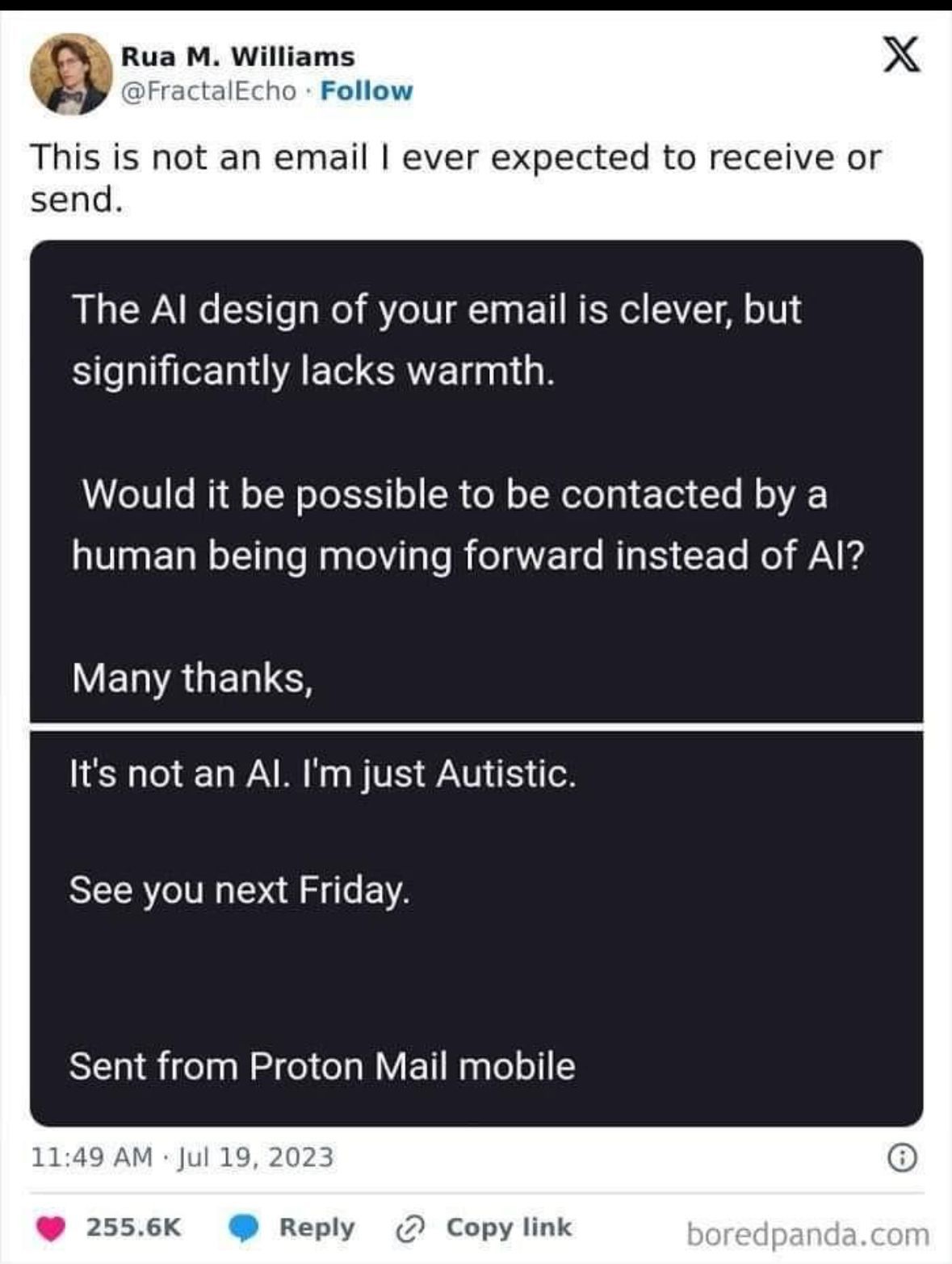this post was submitted on 26 Sep 2024
977 points (99.4% liked)
People Twitter
5226 readers
2329 users here now
People tweeting stuff. We allow tweets from anyone.
RULES:
- Mark NSFW content.
- No doxxing people.
- Must be a tweet or similar
- No bullying or international politcs
- Be excellent to each other.
founded 1 year ago
MODERATORS
you are viewing a single comment's thread
view the rest of the comments
view the rest of the comments

It should be that way always, frankly, I don't know why gooey even got started. Something "gooey" is the last thing I'd want associated with computer stuff
But I loathe all of the stupid attempts at shoehorning pronunciations of initialisms where it doesn't belong
It's not "Sequel" its fucking S-Q-L. They're all initialisms. I will go through my entire IT career and die on this hill.
Do you say J-P-E-G instead of jay-peg?
No because jay-peg actually makes sense and fits well, just like NASA makes sense and fits well. You can say NASA and JPEG without having to introduce additional letters to make it work. Unlike "Gooey", "Sequel", or "Scuzzy" which all require the addon of more letters to actually work
You can just see JPEG and intuitively go "Oh Jay-PEG" you can't say the same for SCSI
You have to "add" letters for JPEG to be pronounceable.
Where? you can pronounce "J" 2 ways. "Je" and "Jay"
"PEG" stands on its own, and it's also a word, "peg"
So when you pronounce Jay-PEG you're just sounding out the "J" and pronouncing the word "PEG". No letters have been added to make it pronounceable
In contrast to "Sequel"/SQL where you need to add a vowel "e" and a consonant "u" to get "sequel"
You literally added the A and the Y to say "jay."
LMAO that was just for easier visualization of the pronunciation of the letter J
https://en.wikipedia.org/wiki/J
And you're not saying "Jay Pee Ee Gee."
Why make a bizarre exception for one letter?
See previous reply:
See previous comment:
And you're not saying "Jay Pee Ee Gee."
Why make a bizarre exception for one letter?
Do you pronounce GIF "Gee-if?"
I suppose you called them small computer system interface drives instead of SCSI drives too.
I just say S-C-S-I instead of "Scuzzy" or whatever it is
Everyone says H-T-T-P, why don't they say "Hettep"‽
Nah, it's scuzzy.
And when I'm trolling, I say "huh-tu-tu-puh" for HTTP.
To get Scuzzy you have to fundamentally modify SCSI and break a few grammatical rules
In English, "S" before a consonant typically retains its standard /s/ sound (as in "stop" or "snow"). Pronouncing "SCSI" as "Scuzzy" violates this by softening the second "S" into a /z/ sound before the consonant "Z," which doesn't follow the rule where "S" remains /s/ unless a voicing context (such as between two vowels) alters it.
English has rules governing when consonants are "soft" (like "S" becoming /z/) or "hard" (like "C" becoming /k/). In "SCSI," these letters maintain their distinct pronunciations, but when forced into "Scuzzy," the "C" becomes part of a hard /sk/ sound, and the second "S" is softened into /z/. These changes are not guided by typical English consonant-hardening rules, especially since "SCSI" does not include the contextual elements that normally trigger these shifts (e.g., vowel placement following "C" in certain cases).
You also have to add whole new vowels like "u" and "y"
The C is hard because the second word is "Computer." The O in "Computer" becomes a "u" sound because "scossy" sounds odd.
Irrelevant, acronyms and initialisms don't depend on the underlying words they stand for beyond the first letter of each word. You can't use the word underlying C or any of the other letters for grammatical justification or pronunciation.
Each letter must stand on its own and be governed by pronunciation rules independently of its underlying word, if it cannot form a sensible pronounceable word (Like FBI, CIA, SQL, SCSI) on its own it's an initialism. If it can (Like NASA) then it's an acronym.
Nah, there are no such rules, like anything else, initialisms are defined by speakers of the language, and that's what industry professionals seem to use most often.
Lol ok, if you want to change to that set of rules, I am an industry professional. Fairly deep into my IT career, and I will absolutely get on to any of my people if I see "Scuzzy" (Not that that particular one will ever come up again, fairly out of date lmao) or "Sequel" or any of that other bull
Maybe it's a regional thing, or maybe you're just a hothead, hard to tell.
Either way, in my region, "scuzzy" and "sequel" are the dominant pronunciations for SCSI and SQL in my field.
Don't even start with PCMCIA
It's not "sequel," it's "squirrel."